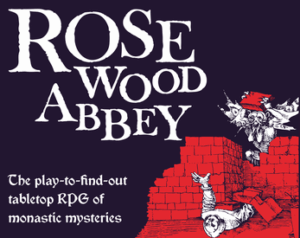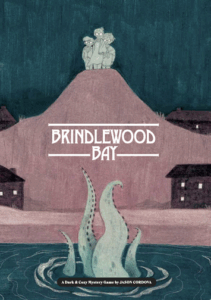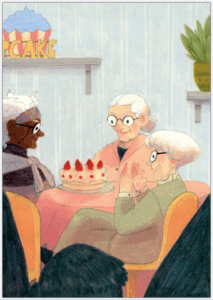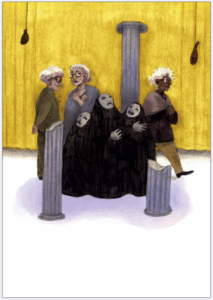This episode the Ludonarrative Dissidents crew are discussing BRINDLEWOOD BAY, an RPG by Jason Cordova, originally published by Gauntlet Publishing in 2020 and in a greatly expanded second edition in 2022, after a Kickstarter that raised almost half a million dollars. It is an RPG of post-menopausal women solving gruesome murders in a picturesque seaside town, with mechanics based on Powered by the Apocalypse (see below).
- More info on Brindlewood Bay at the Gauntlet website
- Preview and buy Brindlewood Bay at DriveThruRPG
‘How meta do you want to getta?’ – Greg
The podcast is kept running with support from our Kickstarter backers, and this episode we want to give a particular shout-out to Greedy, who allowed Greg to give his own shout-out to whatever he wanted, and Greg chose his own website, www.gregstolze.com. Many thanks to Greedy for indulging Greg, and for your generous support.
SHOW NOTES
These are the notes for this episode, a chance for us to pick up the threads, fill in the blanks, throw up some links, and correct the occasional errors that we didn’t have time to deal with in the episode itself.
Brindlewood Bay is Jason Cordova’s first published RPG. He began roleplaying in the 90s with mainstream systems including Marvel Superheroes, AD&D 2e and Rifts, took a break for several years, and came back in 2013 when he discovered the indie scene. He was the lead figure in the online community The Gauntlet, which has also produced the games Hearts of Wulin, Trophy and Trophy Dark, and Cordova’s second RPG The Between. He is not the same person as the SF author Jason Cordova.
Greg kicked the discussion straight off by talking about the concept of the ‘simulacrum‘ popularised in the 1960s by the French and Canadian post-structuralists, and this was the moment that Ross and I knew this episode might not be the ratings blockbuster we were hoping for. The theory of the simulacrum goes back to the Greek philosophers, notably Plato, who claimed there were two kinds of simulacra: ones that are faithful to the original, and ones that are distorted in order to make the copy appear more faithful to the viewer. Jean Baudrillard, who was primarily a semiotician, argued in his 1981 book Simulacra and Simulation that a simulacrum is not a copy of the real, but becomes truth in its own right, a truth that he termed the ‘hyperreal’. What Greg is saying, I believe, is that Brindlewood Bay may be based on the fictional tropes of Murder She Wrote but because it’s nested within multiple layers of simulation (Greg suggests three, I’d say more), each one distorting the copy further from the original, it has become its own hyperreality… actually I’m not sure he draws a conclusion, or that there is a conclusion to be drawn, except that to say Brindlewood Bay is an RPG that’s like Murder She Wrote is in many ways very wrong, and at the same time pretty accurate, and its own thing that pays appropriate homage to the original, but is perhaps hobbled by sticking too closely to its TV-based tropes.
footnote: Murder She Wrote was a television show starring Angela Lansbury as Jessica Fletcher, a writer of murder-mysteries, who each episode was drawn into solving a murder that is ‘real’ within the fiction of the TV series. It ran for twelve seasons 1984–1996, notching up 264 episodes and four TV movies, none of which involve elements of the Lovecraft mythos. It is one of the original progenitors of the genre known today as ‘cosy crime’. A reboot is currently in the works, starring Jamie Lee Curtis omg omg.
second footnote: the Matryoshka doll is better known as a ‘Russian Doll’, and they do originate in Russia, the first ones created in 1890. They have a fascinating history, and the artistry involved in their creation is often highly detailed and carefully nuanced.
To quote Wikipedia, ‘Where Plato saw two types of representation – faithful and intentionally distorted (simulacrum) – Baudrillard sees four: (1) basic reflection of reality; (2) perversion of reality; (3) pretence of reality (where there is no model); and (4) simulacrum, which “bears no relation to any reality whatsoever”.’ Using these tools to analyse Brindlewood Bay is left as an exercise to the reader, though we also note that physicist Alan Sokal called post-structuralism ‘gibberish’ and devised a test to prove it by writing a gibberish academic paper (“Transgressing the Boundaries: Towards a Transformative Hermeneutics of Quantum Gravity”) and submitting it to a leading cultural-studies journal, which published it, and there were SCENES. It has been described as “one of the most wide-ranging academic scandals of the late 20th century.” Sokal has subsequently co-authored cross-disciplinary academic papers with mathematician Dr Alex Scott, the author of the RPG Maelstrom, which we will be examining later this season. And that, friends and colleagues, is how you bring a Ludonarrative Dissidents show-note home.
‘Powered by the Apocalypse’ is a subgenre of RPGs based on the rules, structure and narrative principles of Apocalypse World. Notable examples include Avery Alder’s Monsterhearts, Whitney ‘Strix’ Beltran’s Bluebeard’s Bride (which we looked at in season 1 episode 7) and Thirsty Sword Lesbians by diverse hands.
Blades in the Dark is the universally praised 2017 post-PbtA RPG by John Harper, about building a gang of criminals in a dieselpunk city. We put it through the Ludonarrative Dissidents vivisection in season 1 episode 1.
God’s Teeth, which Greg describes as an ‘actual mystery’, is a critically acclaimed 2023 campaign for Delta Green written by friend-of-the-podcast Caleb Stokes.
We’ve referenced and discussed Thomas Ligotti before but the tl;dr is that he’s an American horror writer heavy on the philosophy, and his works were heavily referenced in the first season of the TV show True Detective.
Magnum P.I. was a light-hearted private-eye TV show contemporary with Murder She Wrote, starring Tom Selleck as Thomas Magnum, a P.I., and set on Hawaii. The two series featured a double-episode crossover in November 1986.
The Golden Girls was a sitcom that also ran contemporary with Murder She Wrote (1985–1992), about four older women sharing a home in Miami. It starred Bea Arthur, Betty White, Rue McClanahan and Estelle Getty. Trivia: in the 1980s ‘older women’ meant the characters were in their 50s. The series came to an end after seven seasons when Bea Arthur left, her character exiting after marrying Leslie Nielsen. A major star of the C20th, Bea Arthur is mostly familiar to geek culture as the original owner of the Mos Eisley cantina in the 1978 Star Wars Holiday Special.
Dark Conspiracy was a 1991 near-future action-horror RPG by Lester Smith, based on the rules from Twilight 2000 and published by GDW. In many ways its setting is not dissimilar from the Dark Future RPG developed by Marc Gascoigne for Games Workshop five years earlier but never published, which we talked about in season 3 episode 9. Meanwhile a second edition of Dark Conspiracy was released by Mongoose Publishing in 2009.
‘Kerflooey’ is a US slang onomatapoeia that dates from 1914 and is related to ‘kerflewie’, ‘kerflewy’, ‘kaplooie’ and ‘kablooie’. Probably an amalgam of the prefix ‘ker-‘ (‘the first element in numerous onomatopœic or echoic formations intended to imitate the sound or the effect of the fall of some heavy body’ – OED) and ‘blooey’ (‘awry, amiss’).
‘Carved from Brindlewood’ is to Brindlewood Bay what Powered by the Apocalypse is to Apocalypse World. There’s no information about it on the Gauntlet website or anywhere else, but as we understand it, it’s an open licence whose terms are loose and largely undefined, originally set out in a tweet from Jason Cordova, and there is no agreement for creatives to sign, no SDK or similar. Essentially designers are free to create and publish games based on the BB structure and mechanics, including chunks of its text, as long as they give proper attribution in their game.
The Name of the Rose is a 1980 novel by Umberto Eco, his first. it is set in 1327, in a remote monastery in the mountains of northern Italy, occupied by a weird collection of grotesque monks, and visited by itinerant Benedictine monk, former inquisitor and mystery-solver William of Baskerville, with his apprentice Adso of Melk, who narrates the book. It is a deep, rich and rewarding text, and the enjoyable movie with Sean Connery, Christian Slater, F. Murray Abraham and Ron Perlman among others, is a mere palimpsest beside it.
 Rosewood Abbey is a Carved from Brindlewood game that is expressly based on the Name of the Rose (and the Brother Cadfael Mysteries), designed and self-published by friend-of-the-podcast Kalum from Les Rolistes. People like it a good deal. Among other reasons to like it, the print version is pocket-sized, and it has a massive example of play in the rulebook, meeting Wallis’s 4th rule of RPGs: “The more unusual a game, the larger the example of play in the rulebook should be”. And examples of play are fun to read.
Rosewood Abbey is a Carved from Brindlewood game that is expressly based on the Name of the Rose (and the Brother Cadfael Mysteries), designed and self-published by friend-of-the-podcast Kalum from Les Rolistes. People like it a good deal. Among other reasons to like it, the print version is pocket-sized, and it has a massive example of play in the rulebook, meeting Wallis’s 4th rule of RPGs: “The more unusual a game, the larger the example of play in the rulebook should be”. And examples of play are fun to read.
Lovecraftian elements in games – Greg says it’s the garlic or the cilantro of gaming, James would argue that it might be the artichoke.
While on the subject of games that start off being one thing and turn into another, particularly ones where that other involves dark eldrich elder beings, we have to mention Night in the Woods, the excellent 2017 pseudo-platform narrative game in which you play Mae, a young cat-person returning to their declining hometown after dropping out of college. A masterclass in character design and narrative structuring, it is a delight right up to the moment where the creators go, “That awesome mystery we’ve been building? Yeah, it’s (handwaving) something something Lovecraft something.”
Outgunned is a fine 2023 RPG of John Wick-style action, where ‘John Wick’ is the guy in the action movies, not the guy who designed L5R and 7Sea. We discussed it in our monthly livestream in January this year. Which reminds me that I should mention we do an hour-long monthly livestream that’s covered subjects from sumo wrestling and RPGs in a can to the destruction of Pompeii, and you can find out when the next one is at our Discord, as well as listening to previous episodes on Youtube.
Greg is right that Edgar Allen Poe laid out a lot of the rules of classic murder-mysteries in his short stories about the detective C. Auguste Dupin, but the first great novels in the genre are The Woman In White (1860) and The Moonstone (1868) by Wilkie Collins, still banging reads today, Rachel Verinder in the latter is one of the great templates of female detectives to come.
The Oscar-nominated Demi Moore movie The Substance is the most high-profile part of a wave of media focusing on menopausal and post-menopausal women trying to negotiate their role in a society that only values youth and beauty, including most recently The Assassin (Amazon Prime), starring Keeley Hawes, which sadly does nothing original or interesting despite an excellent cast. Ginger Snaps, back in 2000, took a similar and arguably more interesting take, linking the onset of female puberty to lycanthropy. Sadly, both The Substance and Ginger Snaps fall victim to the tired trope of having the female protagonist, arguably the victim not the villain, die at the end.
Searching for games tagged with ‘menopause’ on Itch.io: we said in the podcast that there are three results; as of this moment there are now four. Try the search yourself and see if that’s gone up since we wrote this! Don’t bother trying it with DriveThruRPG: at the time of writing there are no results at all there.
About the sealed envelope in the original 2011 Legacy game Risk Legacy: the game contains four sealed envelopes that must be opened when particular game conditions are fulfilled: the first time a faction is eliminated, for example. However, hidden in the game’s packaging is one more sealed envelope simply marked ‘Do Not Open Ever’. If you disobey, the contents will change the game quite radically. I don’t think it’s a major spoiler to say that there are four alternate DNOE packs, all very different, and there is no way of telling which one you have until you open it. A genuinely genius bit of game design by Rob Daviau.
There’s an important difference between the cost of time in RPGs versus time in narrative media like novels, comics, TV shows or movies. Time is cheap in RPGs and very expensive in visual media. A minute of action in RPGs costs exactly the same as a minute of dialogue, in comics it will take up more pages (and therefore cost more), and in TV and movies it will cost exponentially more. Conversely in most video games, which are built around engines devoted to action/combat, it may well be harder to add a minute of dialogue, including scheduling recording sessions with voice actors, creating bespoke animation and so on, than another minute of dynamically generated combat using game-assets and code that probably already exist.
“Experience systems are where you can hold the treat up,” as Greg says. We’ve talked before about Pantheon and Other Roleplaying Games by Robin D. Laws and published in 2000 by Hogshead Publishing, a precursor to his Dramasystem narrative rules which were released by Pelgrane Press as the Hillfolk RPG. Pantheon is a game driven entirely by something very like experience points: you win the game by being the character to unlock numerical points by hitting plot-points and fulfilling tropes of the genre you’re playing in. It’s all about challenging the players to find the treats in the game-story, in a way that’s more explicit than almost any game I can think of. I’ve tried to persuade Robin to let me re-release Pantheon but he’s not interested. Achievement systems in video games are similar: a carrot to keep people playing, often repeatedly grinding missions just to unlock the achievement. Get me to explain why I ragequit World of Warcraft sometime.
The Sweeney was one of the defining UK action-cop series of the 1970s, and holds the same place in British cultural memory that Starsky and Hutch does in the USA. Based around the Flying Squad, an actual branch of the Serious and Organised Crime Command of the Metropolitan Police in London (‘Sweeney Todd’ is rhyming slang for ‘Flying Squad’), it had hard action, intelligent plots, great stars (John Thaw and Dennis Waterman), great dialogue and a fantastic theme. The line “Get your trousers on, you’re nicked” is literally the first piece of dialogue spoken in the first episode.
Brindlewood Bay‘s cover may not be inspiring as these things go, but its interior art by Italian artist Cecilia Ferri (two examples are shown to the right) is excellent and perfectly in keeping with the style and tone of the game.
And finally, we are thinking seriously about creating an Ovenbear tee-shirt for our line of LND-positive merchandise. If you’d wear one, let us know over on the Ludonarrative Dissidents Discord server.
Thank you for listening! The hosts of this episode were Ross Payton, Greg Stolze and James Wallis, with audio editing by Ross and show notes by James. We hope you enjoyed it. If anything in this podcast or these notes has spurred your interest then we invite you to come and chat about it on our friendly Discord.
If you click on any of the above links to DriveThruRPG and buy something, Ludonarrative Dissidents will receive a small affiliate fee. You will not be charged more, and the game’s publisher will not receive less, it’s a win-win-win. Thank you for supporting the podcast this way.


